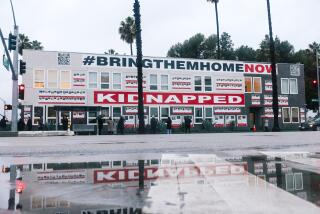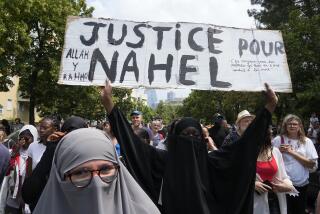CRISIS IN THE BALKANS : French View Hostage Crisis With Detachment : Reaction: Some say it’s the U.N., not their troops, being humiliated. Others see captives as professionals in the midst of a war.
- Share via
PARIS — Front pages of newspapers across France on Tuesday carried stark images of this country’s brave young troops in manacles--solemn soldiers handcuffed to poles, some handcuffed to each other and others with arms raised in surrender to Bosnian Serbs.
These photographs alone might, in another country, stir deep anger, galvanize public opinion and touch off endless political soul-searching. And, to be sure, families of the 4,000 or so French troops on duty with the U.N. Protection Force in Bosnia-Herzegovina are deeply worried.
But most ordinary French--from the village bread-maker to the taxi driver to the corporate executive--have been viewing the Balkan hostage images with a certain distance.
It is, some point out, the United Nations--and not France--that has been taken hostage in such humiliating fashion. And, others say, the young men in the close-cropped hair are professionals in the middle of a war.
“Of course, it has an impact on people, seeing French soldiers taken hostage,” said Didier Witkowfki of the French polling company SOFRES. “But I can’t see that it will make the French react in a particular way.”
One reason, he said, is the post-presidential-election climate, in which the French are more concerned with trouble at home, especially unemployment, than with international affairs.
“Domestic issues are much more important at the moment for the French,” Witkowfki added. “So I don’t think this will have much of an impact. This is a conflict that is more and more difficult for people to understand.”
Ghislaine Pinatel, a 43-year-old Parisian, observed: “Frankly, I can’t get very excited about what is happening in the ex-Yugoslavia because I find the whole thing hypocritical. We send troops there but they can’t intervene, and we do it so our government can have a good conscience.”
The French government has been working with other Western powers to resolve the Bosnian crisis, and Paris has threatened to pull out its peacekeepers unless they get more power to defend themselves against Bosnian Serb aggression. But France’s new president, Jacques Chirac, has been relatively silent.
“Tell us, Mr. President,” the Paris daily InfoMatin asked Tuesday, “why have you lost your voice?”
The French seem more interested in how their new leader responds to this foreign-policy challenge than in the fate of the estimated 170 French soldiers who represent about half the foreign troops held hostage in Bosnia.
“The French are uninterested in what is happening” in Bosnia, said Prof. Bertrand Badie at the French Institute for Political Studies.
“In American public opinion,” he noted, “there is a certain sensibility to these events that doesn’t exist in France. The Americans still have the trauma of Vietnam as a vivid memory. For the French, it has been much longer since we have really been involved in a war.”
As Chirac’s relative silence suggests, French politicians are ill at ease with the Balkans. They still, though, want to be involved in peacekeeping operations and are concerned that the ethnic fighting in Bosnia could spread to other parts of Europe.
Some analysts believe that the French will eventually withdraw troops from the U.N. Protection Force. The United Nations is a target of criticism among French leaders, who contend it is weak and ill-directed.
For families of French troops, photographs of French hostages deliver a personal blow. Most newspapers have begun placing black bars across the eyes of the French hostages in photos--out of respect, editors say, for prisoners of war but also to prevent identifications that would cause even greater emotional distress to families.
French army operations also are traditionally conducted in utmost secrecy; the French seem to prefer that their fighting men and women be anonymous. Few newspapers, for example, have reported on the funerals of any of the 39 French soldiers killed in Bosnia since 1992.
More to Read
Sign up for Essential California
The most important California stories and recommendations in your inbox every morning.
You may occasionally receive promotional content from the Los Angeles Times.














